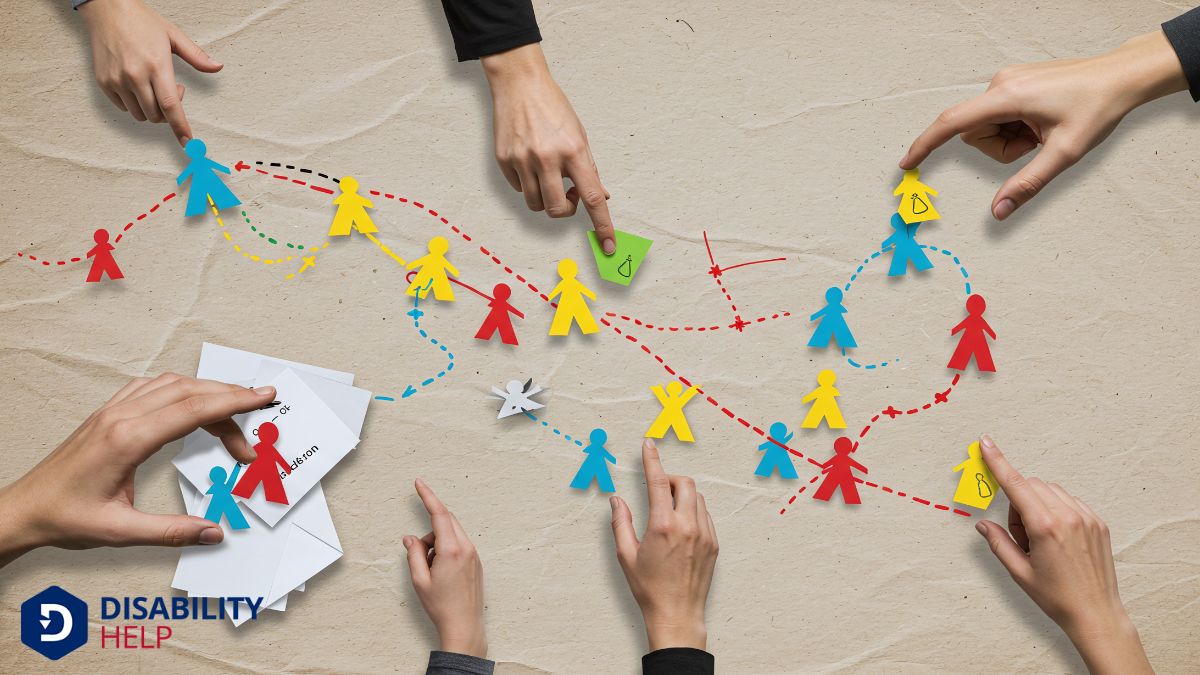Finding housing as a disabled individual can be a complex journey, but you don't have to navigate it alone. By understanding your specific accessibilityThe design of products, devices, services, or environments to be usable by people with disabilities.... needs, exploring government programs like Section 8, and tapping into non-profit resources, you can uncover opportunities tailored to you. Personal advocacyThe act of arguing in favor of, supporting, or defending the rights and interests of individuals or ... and building community support are key strategies. Are you ready to discover how these elements come together to create a path to suitable housing?
Key Takeaways
- Disabled individuals often use government programs like Section 8 vouchers for rental assistance.
- Non-profit organizations provide housing counselingProfessional guidance to help individuals cope with emotional, mental, or social challenges, particu... and aid with application processes.
- Accessibility features such as ramps and wide doorways are prioritized in housing searches.
- Community networks and support groups offer advice and share housing resources.
- Advocacy for specific accommodationsModifications or adjustments in healthcare settings to support patients with disabilities. and understanding tenant rights is crucial in the housing search.
Understanding Accessibility and Housing Requirements

When exploring accessible housing options, it's important to understand the specific requirements that make a home truly accommodating.
Start by considering the physical accessibility features necessary for daily living. For wheelchair users, wide doorways, ramps, and roll-in showers are essential. You should also think about the location of light switches and countertops, which must be within easy reach.
Next, evaluate the safety features. Non-slip flooring and grab barsBars installed in bathrooms or other areas to provide support and prevent falls for those with mobil... in bathrooms can prevent falls.
Don’t overlook the importance of visual and auditory cues if you're hearing or visually impaired. Smoke alarms with flashing lights or vibrations can be life-saving.
Finally, verify that transportation and community resources are accessible. Proximity to public transit and medical facilities enhances independence and quality of life.
Exploring Government Programs and Assistance
Maneuvering the world of government programs and assistance can open doors to housing opportunities for disabled individuals.
You can start by exploring options like Supplemental Security Income (SSI) and Social Security Disability Insurance (SSDI)A U.S. government program that provides financial assistance to individuals who are unable to work d..., which provide financial aid that may help cover housing costs. Additionally, the Section 8 Housing Choice Voucher Program offers rental assistance for low-income individuals, including those with disabilities.
Applying for such programs requires understanding eligibility criteria and gathering necessary documentation. Don’t overlook the Department of Housing and Urban Development (HUD) programs, which offer resources like public housing and supportive housing for persons with disabilities.
It’s essential to stay informed about deadlines and requirements. By maneuvering through these programs, you’ll find valuable support tailored to your housing needs.
Leveraging Non-Profit Organizations and Resources
Although maneuvering through government programs is essential, tapping into non-profit organizations can provide additional support for securing housing. These organizations often specialize in understanding the unique challenges you face and offer tailored resources to help.
Many non-profits provide services like housing counseling, assistance with applications, and connections to accessible housing options. They might also offer financial aid or grants to cover initial costs or modifications needed for accessibility.
Getting in touch with local non-profits is vital. Start by researching organizations focused on disability rightsThe legal and human rights afforded to individuals with disabilities, often the focus of advocacy an... or housing advocacy. Reach out to them to learn about their specific programs and how they can assist you.
Don’t hesitate to ask questions and explore multiple options. By leveraging these resources, you’ll enhance your chances of finding suitable housing.
Personal Advocacy and Navigating the Housing Market
In addition to leveraging non-profit organizations, taking charge of your housing search through personal advocacy can make a significant difference.
Start by clearly identifying your needs and priorities. Document any specific accommodations you require to make your living situation more comfortable. Use this information when communicating with landlords or housing agencies.
Research the housing market thoroughly. Look for listings that highlight accessibility features. Don't hesitate to reach out directly to property managers to discuss your requirements. Be persistent and patient, as the process might take time.
Consider learning about tenant rights in your area. Understanding these rights empowers you to advocate for yourself more effectively.
Building Community Support and Networks

Finding housing can be challenging, but building community support and networks can ease the journey. You’ll find that connecting with others who share similar experiences is invaluable.
Reach out to local support groups and online forums dedicated to disability housing. These communities can offer advice, share resources, and provide emotional support. Don’t hesitate to attend local events or workshops where you might meet people facing similar challenges.
Engage with advocacy organizations that focus on housing for disabled individuals. They often have established networks and can offer guidance.
Building strong relationships with these groups opens doors to opportunities and solutions you mightn't have considered. By fostering these connections, you create a support system that helps you navigate the housing landscape more confidently.
Conclusion
Finding housing as a disabled individual involves understanding your specific needs and taking advantage of available resources. Explore government programs like Section 8, and connect with non-profits focused on disability rights. Don't hesitate to advocate for yourself while maneuvering the housing market. Building relationships with property managers and tapping into community support can make a big difference. Remember, persistence and leveraging your network are key in securing the suitable accommodations you deserve.






